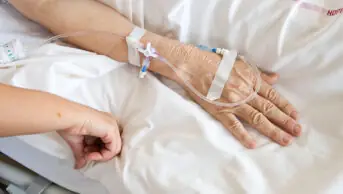
Corrinne Burns / The Pharmaceutical Journal
A study of more than 1,000 cancer patients given cannabis as a palliative treatment found significant reduction in pain and improved quality of life, delegates at a global medical cannabis conference heard.
The research was presented by Lihi Bar-Lev Schleider at the CannaTech conference, held in London on 25 and 26 October 2017. Schleider, medical director of Tikun Olam, one of eight certified providers of medicinal cannabis in Israel, is looking at the clinical outcomes of large populations of patients treated with medical cannabis, as part of doctoral research at Ben Gurion University and Soroka Medical Centre, Beersheba, Israel.
The data presented was collected between March 2015 and Feb 2017, during a study of patients with cancer who were receiving licensed medicinal cannabis from Tikun Olam. Under Israeli law, these medicinal cannabis licences allow patients to obtain up to 30 grams a month of cannabis oil or inflorescence for palliative purposes. The drug is not licensed in Israel for direct treatment of cancer.
Following an initial meeting with a nurse, 1,152 patients — most of whom had been diagnosed with breast or lung cancer — were followed up with telephone interviews at one month and again at six months, to assess the degree of their pain and quality of life using the Patient Global Assessment report. Before palliative cannabis treatment, 50.2% of patients reported pain intensity of 8, 9 or 10, where 0 = no pain and 10 = “worst pain imaginable”. At the end of the six-month period, Schleider reported, only 5% reported pain in this range. Similarly, at the start of cannabis treatment just 19% of patients rated their quality of life as “good”, a figure that rose to 70% after six months.
Although 1,152 patients took part in six-month follow-up studies, during the two years of Schleider’s study 3,357 patients started palliative cannabis treatment with Tikun Olam. During this time, 903 patients died, and 483 stopped cannabis treatment. Furthermore, 339 patients reported 592 side effects including dizziness, dry mouth and tiredness which, Schleider said, demonstrated that medicinal cannabis was not an effective palliative treatment for everyone.

Source: Corrinne Burns / The Pharmaceutical Journal
Delegates in the conference hall
The next steps in research, he said, should involve double-blind placebo-controlled clinical trials to assess the palliative effect of cannabis on various diseases. “Cannabis therapy can improve the condition of many patients with a wide range of diseases,” Schleider said. “My advice to the UK is to permit clinical trials and studies of medicinal cannabis.”
The results of Schleider’s analysis, the largest study to date of long-term outcomes of palliative cannabis treatment in cancer patients, are due to be published in a forthcoming issue of the European Journal of Internal Medicine.
You may also be interested in

Support for pharmacies providing palliative care urged as hospices get cash injection

Patient access to 24/7 palliative care medicines is ‘insufficient’, finds House of Commons-commissioned report
